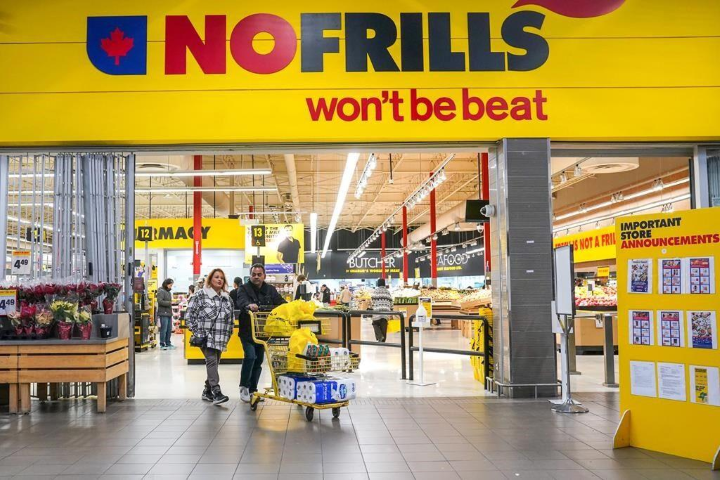
Canada’s biggest grocers are investing money and space in discount stores like No Frills, Food Basics, and FreshCo as shoppers look for ways to save on food. A customer pushes a shopping cart full of groceries from a NoFrills grocery store, in Toronto, on Thursday, November 23, 2023. THE CANADIAN PRESS/Chris Young
Canada's largest grocery chains are pivoting towards discount stores like No Frills, Food Basics, and FreshCo as consumers seek ways to cut costs amidst rising living expenses.
Transitioning grocery outlets to discount formats is a relatively straightforward strategy, according to experts, helping retailers maintain profits as shoppers prioritize budget-friendly options.
Each major Canadian grocer operates multiple store brands, known as "banners," catering to various market segments. Loblaw, for instance, owns No Frills and Maxi, while Metro operates Food Basics and Super C, and Empire oversees FreshCo.
Recent earnings reports from these grocers highlight the significant contribution of discount stores to overall sales growth.
Loblaw is at the forefront of this trend, with over 30 new Maxi and No Frills stores opened last year, either through new locations or conversions from full-service stores, as outlined in the company's annual report.
Melanie Singh, president of Loblaw's "hard discount" division encompassing No Frills and Maxi, emphasized the continued growth potential in discount retail.
This expansion trend is ongoing, with Loblaw announcing a capital investment plan exceeding $2 billion just days before its February earnings release, paving the way for over 40 new discount stores.
Other grocers are adopting varied strategies regarding discount formats. Empire, for instance, focuses on its current portfolio rather than significant expansion into discount retail. The company's recent acquisitions, including Ontario's Farm Boy chain and a majority stake in Longo's, reflect this approach.
However, Empire has strategically opened 52 new FreshCo stores in Western Canada and Ontario over the past six years, aligning with regional demand.
Similarly, Metro has seen growth in its Super C and Food Basics stores, with increased customer preference for discount banners over conventional offerings.
Discount grocery stores typically feature simpler operations and smaller formats compared to full-service counterparts. They emphasize private label products, streamlined displays, and reduced promotional activities.
While discount stores appeal to budget-conscious consumers, the community's preferences still influence product offerings and store layouts.
Converting underperforming full-service stores into discount formats is a strategic move for grocers, often resulting in increased sales without cannibalizing nearby discount outlets.
Despite inflationary pressures driving consumers towards discount options, grocers like Loblaw, Metro, and Empire are well-positioned to adapt to changing market dynamics.
The shift towards discount retail is perceived as low-risk, offering grocers flexibility to adjust their strategies based on evolving consumer preferences.
In the long term, the success of discount formats depends on retailers' ability to understand and meet customers' needs while maintaining profitability amidst competitive market conditions.















